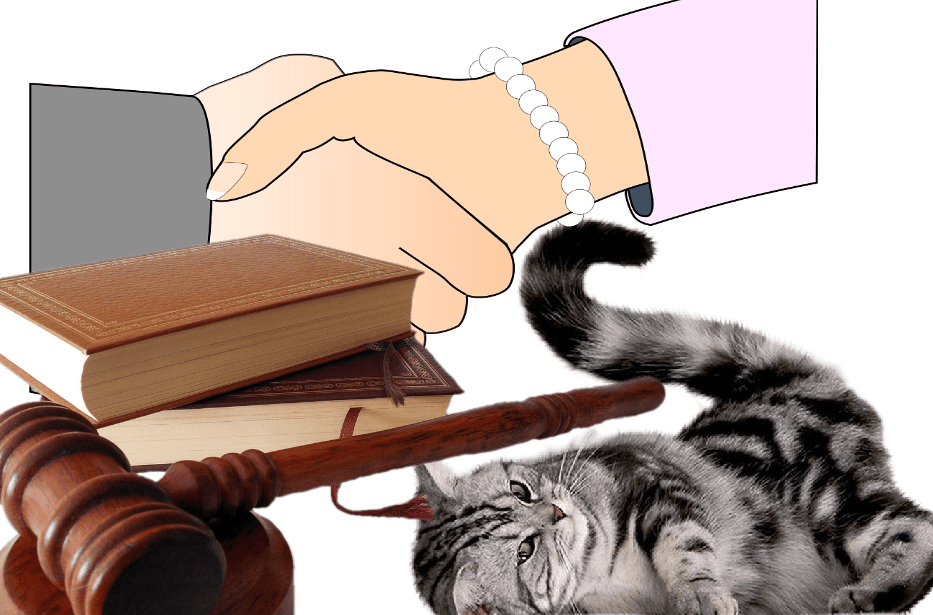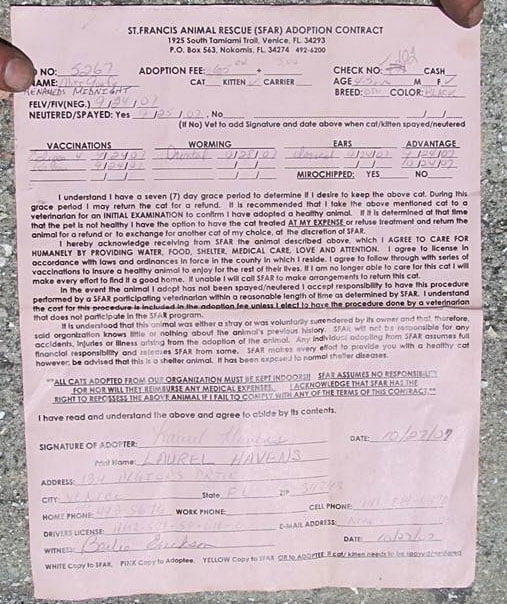‘How to sue on a cat contract’ is about some basic thoughts on the unhappy process of seeking compensation in the civil courts if as a buyer or seller there has been a breach of contract on the sale of a cat, usually a purebred, pedigree cat. This article applies to developed, democratic countries with a decent legal system.
Introduction
It should be noted that the law treats cats and dogs as any other “goods” that you might buy anywhere. When it comes to suing on a cat contract there is no special treatment by the courts because they are sentient beings.

A classic case where you might sue is if the seller says that the cat is good with children. This would be a misrepresentation (see below). Contracts can contain both written terms i.e. express terms and oral terms i.e. what was said. This can complicate matters. It is best that all the terms are written and anything said orally is excluded from the contract. The contract might state this.
If a person buys from a cat breeder, they will have more rights than they have if they are buying from an individual who is not in business. When you buy from a private individual the basic rule ‘caveat emptor’ applies which means ‘buyer beware’. When buying from a breeder, the purchaser is protected by statute which implies terms into the contract. I would argue that a contract between a breeder and a purchaser is governed by statute and the purchaser is better protected as a consequence.
In the UK, the statute which implies terms into a contract is the Consumer Rights Act 2015. It brings into the contract the term that the cat must be of satisfactory quality, fit for purpose and as described.
Before suing on a contract, either party should do their best to negotiate a settlement. Litigation is the last resort.
RELATED: Rescue contract violation: Outside walk for less than five minutes may cost Salem cat owner her cat
Small claims court
The process of suing is relatively easy (depending on where you live 😊) and your mindset. Nearly all claims for compensation for breach of contract on the sale of a domestic purebred cat will be conducted in the small claims court. And the small claims court is designed to be used by people who have little idea of the process. This is a special court where disputes are resolved quickly and inexpensively. I know that they exist in the UK and USA. As the principle behind them is logical they probably exist in many if not all developed countries.
The reason why a small claims court exists is because for small monetary claims it is impractical to hire a lawyer. This is because when one litigates, the issue of legal costs governs a lot of what we do. So, if we sued for $500 and our legal costs are $1000 and we win but the judge does not order that your costs are paid by the loser (or not all of the costs), the whole process has been a waste of time.
And in the small claims court costs cannot be asked for. The whole process is informal and mistakes as to process can be made without penalty, usually, or at least there is considerable latitude. The court and judge will hold your hand (not literally!). There will be a financial ceiling under which the claim must be made. At one time in the UK, it was £5,000 but it varies and rises with inflation. In the USA the general ceiling is $5,000 but for individuals it is $10,000.
So once you have decided to sue you can go online to get the form or go to the court if you want to have a chat about the correct form. The forms are easy to fill in and there is no need to be worried about errors spoiling things but an attempt at excellent accuracy should be made, nonetheless.
RELATED: Veterinarian performs “humane declaw” against adoption contract
Breach of terms and misrepresentation
So, that brings us back to the beginning. What kind of thing can we claim compensation for? Basically, three types of things:
- A major breach of contract including a total failure of consideration
- A minor breach of contract or breach of warranty
- Misrepresentation and misdescription
1. Major Breach – This is called a breach of condition of the contract. A condition is a major term. This occurs when either party (the breeder or purchaser) behaves in a way in relation to the contract that indicates that they are not bound by its terms and have in effect torn up the contract (i.e. repudiated the contract). This allows the other party to elect that the contract is over and seek damages or proceed with the contract and seek damages as well.
A total failure of ‘consideration’ is when as a buyer you have, in effect, nothing to show for monies paid and a seller no money for goods delivered. This is clearly a major breach, as well. An example of the former might be:
- Here is one clause from a sample contract from the BBBengals Cattery (I have given a link as thanks for its use) “Under no circumstances will this cat/kitten be sold, leased or given away to any pet shop, breeder or other individual without the written permission of BBBengals Cattery.” If the buyer is in breach of this term, I would consider it to be a major breach of contract as the clause is written in a way which allows that interpretation (in brown). Should the buyer be in breach of this term the seller/breeder could claim for the full value of the cat sold and the return of the cat. If the cat has been adopted by someone else it complicates things clearly. The cat can’t be returned to the seller unless the next next owner is successful brought into the pleadings (the written claim) as a third party. This would not happen in the small claims court as they are meant to be straightforward.
2. Minor Breach -This is called a breach of warranty. For example, if the seller had failed to carry out one of the first two vaccinations prior to sale and the kitten became ill for a while as a consequence this would probably be a minor breach. The judge will decide but it is probably not viable to sue for a minor breach if the sums of money involved are low (even for a major breach) as the trauma and trouble of suing is worth more in monetary value that the amount claimed.
3. Misrepresentation – This is something said by either party that induces the other party to enter into the contract and upon which, the party relied. Here is an example:
- The seller/breeder says that the cat is a past CFA champion or has tested negative for HCM but fails to produce the papers and you accept this in good faith and act on it and buy the cat as a breeding cat. What has been said is not in the contract, however. This is likely to be an actionable misrepresentation and the contract rescinded (turned back to before the contract). Either that or the judge will decide that what was said is a term of the contract. In which case it will be a major breach and damages to the value of the cat be awarded to the buyer.
Lastly, where there are express written terms, they will supersede terms implied by statute. In Britain this would be terms implied by the Sale of Goods Act or an act that replaced it (the Consumer Rights Act 2015). There will be similar terms that can be implied in the USA, I am sure. These extra terms can be useful if the contract provided by the breeder is deficient and this is not spotted by the buyer. In other words, there may be a breach of implied terms and not written terms. A seller may mention in the contract that the implied terms are not excluded. This post is not meant to be comprehensive.

RELATED: Law of Contract Concerning Cats
Some more thoughts
This article is meant to be a brief overview to help people get into the process. It should not be a scary process. If you are a buyer or seller and the other party is in breach of the contract then you should consider suing. The amount of money concerning should be of a reasonable size otherwise the whole process becomes too problematic. I would suggest something in the order £1000 is the minimum to sue one which would be about the cost of a purebred cat.
All cat breeders should provide a written contract which you should read carefully. Both parties sign it. If they don’t provide a written contract, you still have an oral contract. It is just harder to prove the terms of the contract if it is entirely oral. Written contracts are designed to prevent arguments. They clarify the situation. They are proactive measures. I would always recommend that you enter into a written contract when buying a cat. It helps prevent unforeseen problems that may occur in the future.
Animal shelters normally have contracts to but if one party is in breach, I would doubt that the other party would sue for compensation because the amounts involved are too small. You could sue for an injunction for the return of a cat rather than money. So, if an adopter from a shelter misbehaved and was in violation of the shelter contract, the shelter might be able to apply to a local court for an injunction. This would not be a small claims court however. This would complicate matters. I suspect that this rarely happens because of the complexities
![]()


Very informative article – How to sue on a cat contract. Where can I find the laws to do this in Belgium? What legal text should I include in a contract between myself (female breeder) and the male breeder? Is it correct that both parties should have proof of receipt of payment, proof of stud pedigree details, proof of organisations they belong to, contact details for both parties veterinarians? What else should be included? An email reply with an English example is warmly welcome. Email address is felinequeen69@gmail.com Thank you and keep safe.